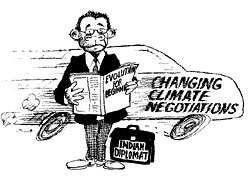Kyoto s ghost will return
 if, by the grace of God, the predicted ill-effects of global warming are muted or just fail to appear, then the world can write off Kyoto as an unnecessary exercise. But if indeed they bear upon humanity as predicted by most scientists, then the ghost of inaction in Kyoto will repeatedly come back to haunt the world.
if, by the grace of God, the predicted ill-effects of global warming are muted or just fail to appear, then the world can write off Kyoto as an unnecessary exercise. But if indeed they bear upon humanity as predicted by most scientists, then the ghost of inaction in Kyoto will repeatedly come back to haunt the world.
Just what is it that the high drama of Kyoto has left us with? The simple answer is: Almost nothing. The reduction target of 5.2 per cent over 1990 levels for industrialised countries as a whole simply means 'business as usual' at 1996 levels. Global warming campaigner of Germany's leading nature conservation non-governmental organisation ( ngo) , Sascha Muller-Kraenner, says, "If we look at 1996 levels of emission of carbon dioxide, the major greenhouse gas, then the industrialised countries as a group are already below 1990 levels by about 4.5 per cent.' In other words, as long as industrialised countries as a group stabilise around 1996 levels, they will have met the Kyoto target, which was agreed on after such high drama. The 1996 levels are below 1990 levels largely because of the economic collapse in the former Soviet Union countries and Central and Eastern Europe.
What do these targets mean for the environment? Again, precious little. As Mike Hulme of the University of East Anglia in Norwich (uk) explains in a letter to New Scientist, "According to one of the climate models used by the ipcc , the difference between doing nothing as a result of Kyoto and adopting the eu position of 15 per cent cuts for industrialised countries is the difference between, respectively, 1.9
